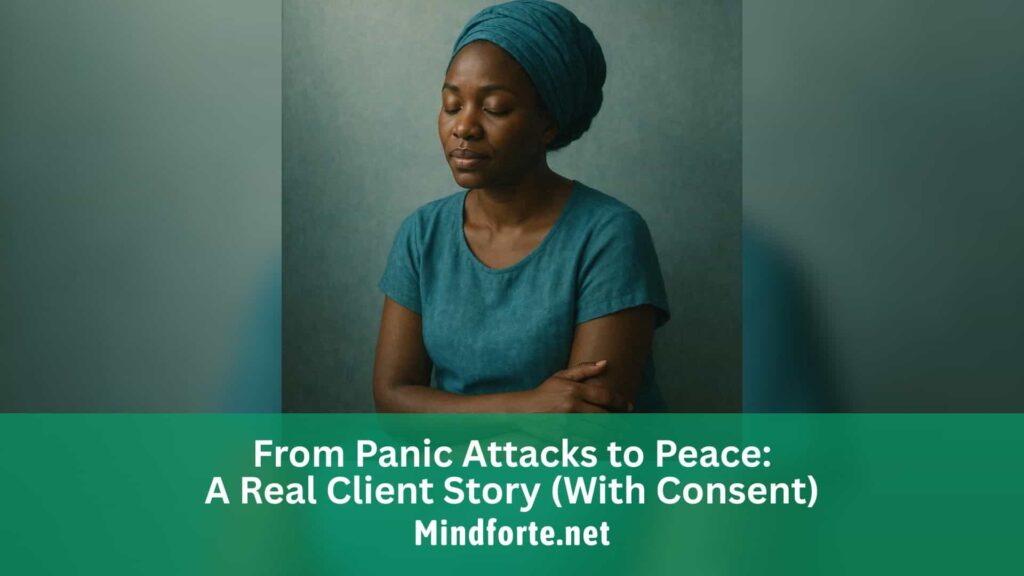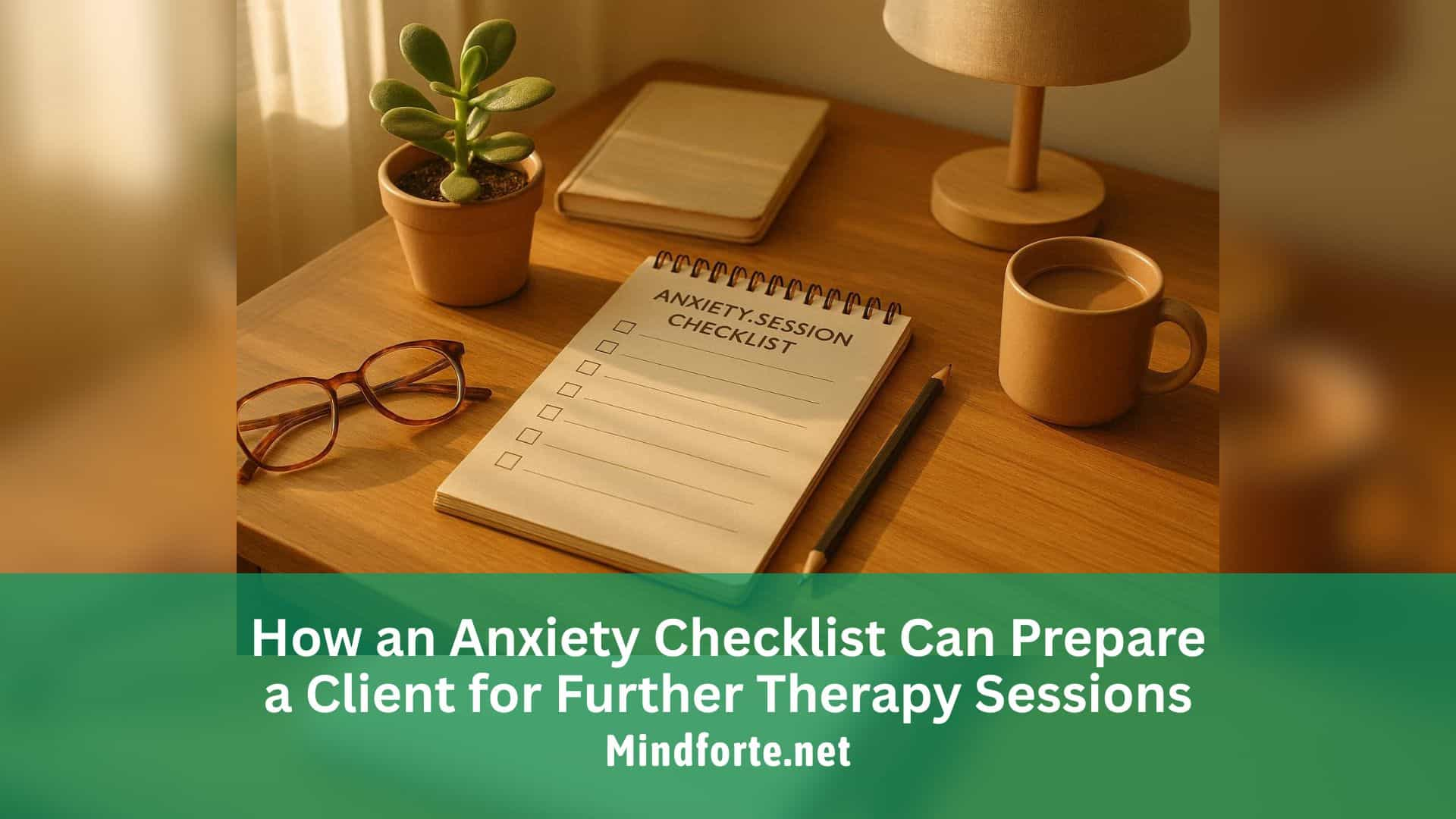She was only a few days postpartum when it began.
At first, it was a strange tightness in her chest, like she could not catch her breath.
Then came the racing thoughts – “What if something is wrong with me? What if I collapse and no one helps?” – followed by waves of confusion that left her trembling.
She thought it was spiritual. “Could it be an attack? Maybe someone does not want me to enjoy motherhood.”
Each episode came without warning, leaving her shaken.
Nights became harder. She lived in constant dread of the next attack.
When she tried to share her fears, the replies made her feel ashamed.
“Pray harder, it’s the devil.”
“Snap out of it, you’re not the first woman to give birth.”
“Be strong, the feeling won’t last.”
She was a new mother, exhausted, and desperate for peace. Instead, she felt misunderstood, alone, and afraid of her own body.
For a month, she endured the cycle of panic in silence.
And she is not alone.

Table of Contents
- Why Panic Attacks Are Often Misunderstood
- The Agitation: Living With Untreated Panic
- The Turning Point: Seeking Help
- The Solution: Tools That Rewire the Mind and Body
- The Transformation: From Fear to Peace
- Why Her Story Matters
- The Benefits of Talking to a Therapist
- Living With Ongoing Management
- What This Means for You
- Your Next Step Toward Peace
Why Panic Attacks Are Often Misunderstood
In Nigeria, stories like hers are often dismissed as weakness, lack of faith, or “spiritual warfare.”
Because of stigma, many keep quiet about what they are going through.
Panic attacks may seem to be weakness or punishment, but they are not.
Panic attacks are sudden waves of fear that cause real physical symptoms:
- racing heart
- shortness of breath
- dizziness or confusion
- overwhelming feelings of dread
Without help, they can make daily life feel unbearable.
Mislabeling them keeps people from seeking care.
The problem is the silence, the stigma, and the dismissive words that keep people suffering alone.
The Agitation: Living With Untreated Panic
For this client, each day was a battle. Attacks came while nursing, resting, or playing with her baby.
She began avoiding places and activities.
She doubted her ability to care for her child.
The joy of motherhood was replaced by constant dread.
She started to doubt herself. “Am I losing my mind? Am I weak? Maybe everyone is right.”
Untreated panic attacks drain self-confidence, push people away from life, and create silent suffering.
If ignored, they can grow into anxiety or depression.
Yet, many still believe the answer is to “toughen up” or “think positively.”
The Turning Point: Seeking Help
After a severe attack where she thought she might faint while holding her baby, she decided she could not go on like this.
She reached out for professional help.
This choice was her first step toward peace.
At our clinic, we carried out a careful assessment.
Her symptoms matched panic attacks caused by the stress of postpartum changes.
She was unsure at first – especially when we suggested tools like Cognitive Behavioral Therapy (CBT) and deep breathing.
She asked, “How can breathing or changing my thoughts stop something that feels so real in my body?”
But as we worked together, she began to notice change.
The Solution: Tools That Rewire the Mind and Body
- Cognitive Behavioral Therapy (CBT)
She learned her thoughts were feeding her panic. The thought “I might collapse” triggered fear, which caused body symptoms, which made the fear stronger.
We practiced spotting these thoughts, questioning them, and replacing them. Instead of “I will collapse,” she learned to say, “This is my body’s alarm. It feels scary, but I am safe.” - Deep Breathing and Relaxation
We worked on slow, steady breathing. At first, it was hard – her mind kept racing. Over time, just five minutes of deep breathing began to ease her attacks. - Lifestyle Adjustments
She began gentle exercise like short walks and riding a bicycle to release tension. We also introduced games like chess, Scrabble, and Ayo to build focus and mental strength. - Supportive Therapy Sessions
She needed a space where she could speak freely without judgment. Therapy gave her that – a place to be heard, understood, and supported.
Little by little, she began to feel in control again.
The Transformation: From Fear to Peace
Over the next few months, the panic attacks came less often and felt less intense.
She began to notice the early signs – a racing heart, a rush of fearful thoughts – and was able to pause before the fear took over.
Instead of spiraling, she used her tools: slow breathing, grounding exercises, or shifting her thoughts.
She even began to enjoy playing with her baby without the heavy shadow of dread.
It was not instant. On some days fear still tried to return.
But each time, she found she was stronger and more capable than she had believed.
In her words:
“Thanks to Mindforte’s help, I’ve been able to get an improved quality of life. I can now live my life panic-free.”
Why Her Story Matters
Her journey shows three important truths:
- Panic attacks are real. They are the body’s alarm system misfiring – but they can be treated.
- Stigma slows recovery. Dismissing panic as “not serious” or labeling it as spiritual warfare keeps people from getting the care they need.
- Therapy works. With professional help, people can learn to manage anxiety and take back their lives.
Panic attacks are only part of the story.
Many Nigerians live with depression, trauma, or emotional pain, unsure whether they should ask, “Do I need therapy?”
The answer is simple: if your struggles affect your daily life, relationships, or peace of mind, therapy is worth it.
The Benefits of Talking to a Therapist
In her eyes, therapy was a process of building tools to soothe her body and shape her thinking.
This is one of the greatest benefits of therapy: walking away with tools you can use for life.
Evidence-based methods like CBT have been shown to work well for panic and anxiety (American Psychological Association).
Many clients improve without medication.
Therapy also creates a safe, non-judgmental space.
In places where stigma is strong – as in Nigeria – that space can change lives.
Living With Ongoing Management
Today, she still uses her tools whenever stress appears.
Gentle exercise helps her stay grounded.
Mental games keep her mind active.
Deep breathing is her anchor in moments of tension.
Now, the attacks that once ruled her life are rare, short, and no longer in control.
Her story is proof that with the right support, peace is possible – without shame.
What This Means for You
If you are living with unexplained fear, anxiety, or panic attacks, know this: you are not alone, and you are not weak.
Signs you might need therapy:
- Anxiety that affects daily life
- Being told to “snap out of it,” but nothing changes
- Avoiding activities because of fear
- Stress affecting your body
If these sound familiar, seeking mental health care is necessary.
Your Next Step Toward Peace
Her story is a reminder that recovery is possible and closer than you think.
You do not have to live with panic in silence.
You do not have to carry fear as a burden.
Therapy can help you take your life back.
Book an appointment today at Mindforte Psychology Clinic: www.mindforte.net/booking/
A Question for You
Have you or someone you love ever faced fear or panic that others dismissed? How did you cope? Share in the comments – your story might help someone else find courage.
References
- American Psychological Association (APA). “Cognitive Behavioral Therapy (CBT).” https://www.apa.org/ptsd-guideline/patients-and-families/cognitive-behavioral
- Mayo Clinic. “Panic attacks and panic disorder.”
https://www.mayoclinic.org/diseases-conditions/panic-attacks/symptoms-causes/syc-20376021 - National Institute of Mental Health (NIMH). “Anxiety Disorders.” https://www.nimh.nih.gov/health/topics/anxiety-disorders
- Hofmann, S. G., Asnaani, A., Vonk, I. J., Sawyer, A. T., & Fang, A. (2012). The Efficacy of Cognitive Behavioral Therapy: A Review of Meta-analyses. Cognitive Therapy and Research, 36(5), 427–440. https://doi.org/10.1007/s10608-012-9476-1


